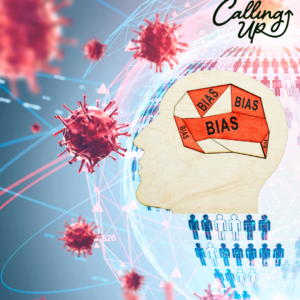In the battle against the COVID-19 pandemic, understanding the intricate workings of the human mind is crucial. Cognitive biases, systematic deviations from rational thinking, can significantly impact individuals’ decisions regarding COVID-19 safety precautions. Five prominent biases—Optimism Bias, Confirmation Bias, False Consensus Effect, Availability Heuristic, and Hindsight Bias—wield considerable influence, contributing to a reluctance or neglect of crucial preventive measures.
Optimism Bias
Optimism Bias, a cognitive distortion leading individuals to believe they are less susceptible to negative events than others, plays a pivotal role in undermining COVID-19 precautions. People may downplay their vulnerability to the virus, underestimating the necessity of precautions such as mask-wearing and vaccination. Overcoming Optimism Bias requires fostering a realistic understanding of personal risk and emphasizing the importance of universal preventive measures.
Confirmation Bias
Confirmation Bias, the tendency to favor information that supports existing beliefs while disregarding opposing evidence, can hinder the adoption of COVID-19 precautions. Individuals might selectively consume information that aligns with their views, overlooking data supporting the efficacy of safety measures. Addressing Confirmation Bias involves promoting evidence-based information through diverse channels and cultivating a culture of critical thinking.
False Consensus Effect
False Consensus Effect arises when individuals overestimate the extent to which others share their beliefs or behaviors. In the context of COVID-19, this bias may lead people to assume that everyone around them shares a similar lax attitude towards safety measures. Combatting False Consensus Effect involves highlighting the diversity of opinions and behaviors within communities, emphasizing the collective responsibility for public health.
Availability Heuristic
The Availability Heuristic influences decision-making based on easily accessible information, often from recent or emotionally charged events. In the context of COVID-19, individuals might be swayed by vivid news reports, overestimating the immediate risk and subsequently neglecting preventive measures. Countering this bias requires providing balanced and contextual information, encouraging a comprehensive understanding of the situation beyond sensationalized narratives.
Hindsight Bias
Hindsight Bias, or the “I-knew-it-all-along” phenomenon, occurs when individuals perceive events as predictable after they have happened. This bias may lead people to downplay the necessity of precautions by attributing their lack of negative outcomes solely to their own foresight. Combating Hindsight Bias involves emphasizing the importance of making decisions based on available information and probabilities, rather than relying on the outcome as proof of the decision’s quality.
In Conclusion
In the intricate tapestry of human decision-making, cognitive biases can be formidable obstacles to the adoption of COVID-19 safety precautions. Recognizing and addressing Optimism Bias, Confirmation Bias, False Consensus Effect, Availability Heuristic, and Hindsight Bias is essential for fostering a collective commitment to public health. By promoting a realistic understanding of risks, encouraging critical thinking, and emphasizing the ongoing nature of the pandemic, we can navigate these cognitive biases and forge a path towards a safer and healthier future.

